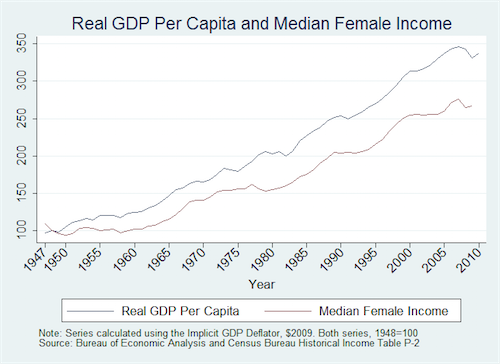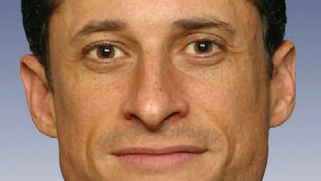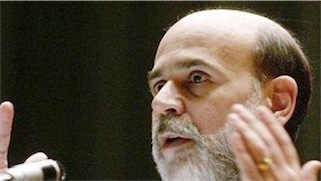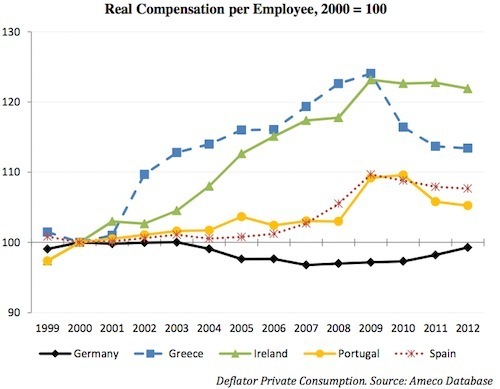Matthew Yglesias's Blog, page 2282
June 8, 2011
No Great Stagnation In Women's Earnings
Alex Tabarrok highlights the fact that the phenomenon of stagnating household incomes is really strictly a phenomenon of stagnating male incomes. Women's incomes are rising in line with overall economic growth:

Women are earning at a lower level than the average, reflecting persistent pay discrimination and the fact that women generally work in lower paying occupational categories. I suppose there are a number of different ways one could look at this. One is that sharply reducing the structural barriers to women's participation in the labor force outside the teacher/nurse/secretary troika constituted a major liberalization of labor markets, on a par with a gigantic policy switch, even though relatively little of it was done through formal legislation. That ought to have made the American economy much more efficient. But instead of accelerating growth, what we got from this increase in labor supply was a loss of earning power by working class men. It's all part of a broad story of the past 30 years in which macroeconomic policymakers have been extremely good at preventing inflation but haven't succeeded at preventing recessions and have actually gotten worse at ending them quickly.


Breakfast Links: June 8, 2011
— Long odds for iCloud.
— Stephen Roach, Morgan Stanley's Chairman for Asia, is bullish on China but I suppose he would be.
— The resignation of Syria's ambassador to France could be a big deal for diplomatic action against the regime.
— Israeli settlers set fire to West Bank mosque.
— The IPO cartel.
— Using conditional probabilities to estimate the electability of GOP contenders.


June 7, 2011
Magneto Was Right

Susana Polo liked X-Men: First Class but has some concerns, including the fact that "[b]y the end of the film every single non-white mutant allies themselves with Magneto or Sebastian Shaw" so that by the end "the X-Men become an all-white team."
This didn't bother me so much (the issues she raises about the depiction of women is a different matter) because if you restrict your attention to what's actually in the text Magneto is clearly in the right and Xavier's X-Men are a bunch of dupes. The film is a pretty serious departure from the conventional depiction in this regard, but it's quite thoroughgoing. Magneto's mutant pride attitude is in every way more admirable than Xavier's preference for the closet, and Xavier's political view that mutants and humans can coexist peacefully if mutants avoid provocations is directly contradicted by the events at the end of the film. When Xavier is trying to convince Magneto (and the audience) that Magneto's more militant methods will cost innocent life he literally says—to a Holocaust survivor!—that "they were only following orders" and therefore their sins are forgivable.
The mutant pride message is a radical one. It's too radical for those whose WASP male privilege in their non-mutant lives makes them instinctively want to identify with existing power structures. But a mutant who's also a Jew, or a woman, or a racial minority, or has had blue or red skin all of his or her life doesn't suffer from that kind of false consciousness and gets ahead of the curve.


If You're Interested In Anthony Weiner's Character, You Should Look At His Career As A Politician

I know not everyone agrees with this, but it always strikes me as slightly bizarre to think that learning about Anthony Weiner's sexting habits has told us important things about his character that would cause us to re-evaluate him as a public official. Character counts, of course, and you sometimes have very little information on which to base a decision. But in Weiner's case that's not true. Even though he's only 46, he's been working in politics non-stop since graduating from college. He was on the staff of then-Congressman Chuck Schumer, ran for City Council with Schumer's support, then when Schumer got elected to the Senate in 1999 he took over Schumer's old seat. Since that time he's followed his mentor in aggressively courting media attention, and for a few years now has been wading back into municipal issues as he considers a mayoral campaign. There's a long record here to explore. You by no means need to limit your analysis to his voting record or his position on "the issues" if you have deeper character concerns. You might disparage him as more of a showhorse than a workhorse. Or you might admire him as someone who's using the media to punch above the weight of your average backbench House member.
The idea that we should regard this extensive record in the career to which Weiner has dedicated his entire adult life as somehow fake, and his after hours twittering as revealing his "real" character just doesn't make a ton of sense.
One way to see this through an extreme case is perhaps just to observe that the demands of being President of the United States are straightforwardly incompatible with being a model husband and father. The hours, the travel, and the stress just don't make it add up. But it can't be the case that all Presidents of the United States lack the requisite character to be President of the United States. It has to be the case that the kind of character that matters for a public official isn't the same as the kind of character that matters to be a good husband and father. After all, you want a responsible public official to neglect his family and friends ("hard-working"), to display a certain kind of ruthlessness and cunning ("negotiation"), to be a bit of a phony in certain situations ("diplomacy"), and all kinds of other things that don't carry over straightforwardly from personal life to public affairs.


Ben Bernanke Warns Against "Self-Defeating" Spending Curbs That Could "Undercut the Still-Fragile Recovery"

In his speech today about the economic outlook, Federal Reserve Chairman (and former George W Bush Council of Economic Advisors Chairman) Ben Bernanke warned that although closing the long-term budget gap is important, policymakers should avoid counterproductive near-term austerity budgeting of the sort that's failed in the United Kingdom. Specifically, Bernanke cautioned that "a sharp fiscal consolidation focused on the very near term could be self-defeating if it were to undercut the still-fragile recovery."
Bernanke also rebutted the growing chorus of hard money fanatics (including Rick Santorum, Paul Ryan, and Tim Pawlenty) who've taken to accusing Barack Obama of a devious plot to "debase" the currency:
Slow growth in the United States and a persistent trade deficit are additional, more fundamental sources of recent declines in the dollar's value; in particular, as the United States is a major oil importer, any geopolitical or other shock that increases the global price of oil will worsen our trade balance and economic outlook, which tends to depress the dollar. In this case, the direction of causality runs from commodity prices to the dollar rather than the other way around.
Bernanke's comments were disappointing in that he promised no new monetary stimulus for the economy despite high unemployment and what he conceded to be a bleak economic outlook. Still, his remarks on fiscal policy and exchange rates—coming from a man who counted as a conservative economist in good standing just a couple of years ago—are an important reminder of how far out of the mainstream the American right has swung since the 2008 election.


Adventures in 18th Century Health Care
From Robert Middlekauf's The Glorious Cause: The American Revolution, 1763-1789:
When surgeons were available they took care of the wounded. Bleeding the wounded sometimes served as treatment and not always with fatal results. Dr. James Thacher, who was taken into the medical department of the army as a surgeon's mate, reported that one of his senior colleagues, a Dr. Eustis, once treated a "dangerous wound" of the shoulder and lungs by bleeding. While dilating the wound, Dr. Eustis "recommended repeated and liberal bloodletting, observing that in order to cure a wound through the lungs, you must bleed your patient to death." Thacher reported that the wounded man recovered; the principal reason, Thacher believed, was the treatment he received.
I think discussions of health care economics pay far too little attention to the question of pre-modern health care. People have been earning a living as medical professionals for a long time. And yet everybody knows that the invention of actually useful medical treatments is pretty recent development. Surely this tells us something about the nature of the health care consumer's ability to find and purchase cost effective treatments.


Germany's Great Stagnation
It's going to take me more time to process Fritz Sharp's lecture (PDF via Henry Farrell) on the political economy of the euro, but one point he emphasizes is that to understand the present situation, you need to understand what was happening in Germany before the crisis. There, a Red-Green coalition government under Gerhard Schroder spent 2000-2005 pursuing a basically right-wing agenda of relaxing employment regulation and cutting various benefit programs. At the same time, Germany's labor unions worked with employers to practice very severe wage restraint.
This meant that while Spaniards and Italians and Greeks were getting richer, Germans weren't:

One of the reasons Germany had to do this is that the adoption of the Euro produced windfall reductions in interest rates for Germany's new partners in monetary union:

Germany used to get a major interest rate discount from the financial community thanks to its fiscal and monetary rectitude. Monetary union brought German-style interest rates to Germany's partners, and since Germany's inflation rate remained unusually low, it found itself with Europe's highest real interest rates. A huge spike in unemployment was avoided only because of Schroder's cuts and the union-business alliance to keep wages down.


In Search Of Affordable Farmland

I got an email the other day from a reader asking what I thought of conservation easements for farmland, and I said I didn't really know anything about it. The general idea is to try to find a way to take land on the fringes of metropolitan areas and prevent it from being redeveloped into strip malls or suburban houses without screwing over the owner of the land. The problem here is that you're introducing some potentially large distortions into the economics of the land ownership in a way that can lead to some unpredictable effects. And, indeed, when Sarah Laskow looks for people approaching this issue from the other direction — urban hipsters looking to become small scale farmers — it turns out that these policies don't really succeed in generating affordable farmland. As she explains "[r]etirees or city-dwellers looking for a second home can outbid a capital-poor farmer" and these easements are also valuable to rich people as tax dodges.
As readers can probably guess, the main idea I have about this is that we should relax regulatory restrictions on increased density in already built-up areas. People are going to live somewhere. If existing suburbs and central cities don't get denser, then either we have to turn farmland and wilderness into new housing or else everyone has to move to the desert. And as it happens, Nevada was the fastest-growing state over the past decade followed by Arizona. But Nevada is neither a vibrant land of economic opportunity nor an ecologically sustainable place for people to be living.


Poverty and the Lump of Willpower

Jamie Holmes has a very interesting piece in TNR about psychological and economic research into the interplay of poverty and self-control. Basically there's a fair amount of research indicating that that mental self-control is a kind of finite resource. Resisting temptation is mentally exhausting. And it even appears that making any kind of tough decisions about trade-offs has the same effect. Since poor people face more intense tradeoffs, this means that simply making the decisions of ordinary daily life is exhausting and leaves behind less mental energy for other things.
In Poor Economics, Abhijit Banerjee and Esther Duflo make the point that poor people face certain kinds of choices that people in rich countries simply don't make. You can't rent an apartment in the United States that doesn't have running water, and the safety of the municipal water supply is a public responsibility. Poor people in poor countries, by contrast, need to make active decisions about acquiring and purifying water. This isn't just inconvenient in the sense that getting the right purification tablets might be expensive or boiling it might take time, it requires mental energy. You have to remember to do it, decide to do it, and follow through. And it's like that over and over and over again—basically nothing can be taken for granted when you're living near the margins of subsistence. And that, in turn, makes it extremely difficult to consistently make the good decision that you'd need to make to get away from subsisitence.


The Myth Of The Jobless Recovery

It's not the most deepest economic insight of all time, but I was glad to read this line in Christina Romer's May talk on the economy (PDF, via Ezra Klein) about the myth of the jobless recovery:
There is a lot of talk about whether this is a jobless recovery. The truth is, this has been a somewhat "growthless" recovery. Job growth is weak because GDP growth is weak. Aside from just a few quarters, GDP growth has been at or below its trend rate of growth of about 2½ percent. We just learned last week that GDP grew at only 1.8% in the first quarter of this year.
You only reduce unemployment with above-trend growth in output. So the question is this: If the Fed or Congress contrived to increase the demand for goods and services, would America start producing more goods and services or would prices just go up? I say producing more. When I went to Phoenix (MSA unemployment rate 8.1 percent), I got a drink at a bar at happy hour that had 70 percent of its seats empty and only one bartender working. I think that if people in Phoenix got a principal writedown on their mortgages, they'd have more disposable income and might go to the bar more. I think that if Ben Bernanke dropped money from a helicopter over the city of Phoenix, that people would have more cash in their pockets and might go to the bar more. Then I think more people would be employed as bartenders and busboys. We might need more people to drive trucks to deliver the beer. Breweries might need people to work more shifts. I don't at all believe that Phoenix-area bars would throw their hands up and say, "Skill-mismatch! Can't serve any additional customers, gotta raise prices."


Matthew Yglesias's Blog
- Matthew Yglesias's profile
- 72 followers



